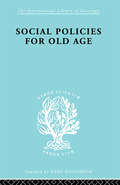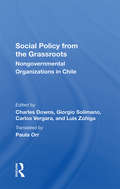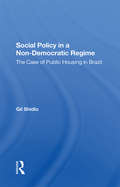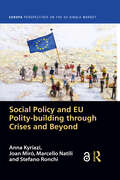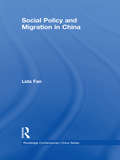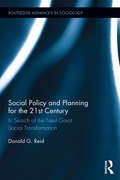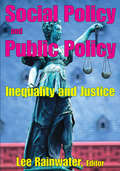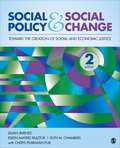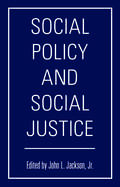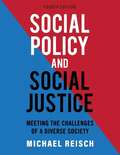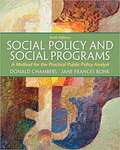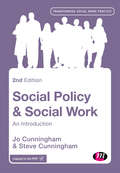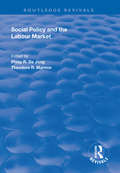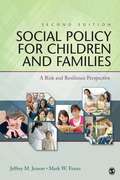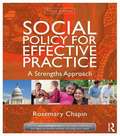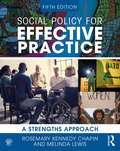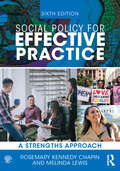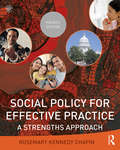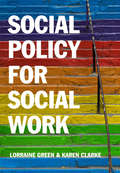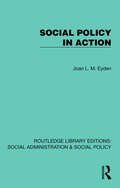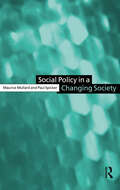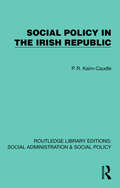- Table View
- List View
Social Policies for Old Age: A Review of Social Provision for Old Age in Great Britain (International Library of Sociology)
by B. E. ShenfieldFirst Published in 1998. Routledge is an imprint of Taylor & Francis, an informa company.
Social Policy From The Grassroots: Nongovernmental Organizations In Chile
by Charles Downs Giorgio Solimano Carlos Vergara Luis ZunigaThe United Nations Children's Fund (UNICEF) has traditionally maintained very fruitful relationships with non-governmental organizations. The editors want to emphasize here is the significant role that these institutions play in designing and implementing programs to promote the development of children and women. This ·book is an analysis of non-go
Social Policy In A Non-democratic Regime: The Case Of Public Housing In Brazil
by Gil ShidloThis book had its origins in my doctoral research at the London School of Economics. It developed more rapidly than expected thanks to the good will and collective efforts of various people and institutions who provided help and support-material, intellectual and moralthroughout four years at the LSE and two years at Tel Aviv University. I am most grateful to George Philip and Patrick Dunleavy, who have patiently read the many drafts and offered their comments and suggestions at various stages of this work. I would also like to thank Peter Dawson, who during my early days at the LSE as a research and MSc student, supervised, advised and above all encouraged my intentions to carry out research on developing countries. Henrique Rattner of the Fundacao Getulio Vargas provided me not only with technical support but also introduced me to the complex Brazilian bureaucracy. Gabriel Bolaffi, of the Faculty of Architecture and Urbanism at the University of Sao Paulo, made it possible for me to gain access to the otherwise restricted public housing agencies. I also extend my gratitude to the officials at COHAB/SP, CODESPAULO, INOCOOP and the BNH (in Rio de Janeiro and Sao Paulo) who spared precious time to be interviewed and supplied me with published and unpublished documents. The IPT (Sao Paulo Institute of Technological Research) provided the primary material on ltaquera and enabled me to use their computing facilities and process the data. Special thanks are due to Ros Mari Kaupatez. The friends we made in Sao Paulo, whose welcome and warmth surpassed all expectations, made a long stay more bearable. This project could not have been carried out without the moral and financial support of both my grandfather and my parents, who took a deep interest in my studies and encouraged me during difficult periods. A debt of thanks is also owed to the Publication Committee of the London School of Economics, especially P. C. Davis. Anthony Hall's comments were very valuable. Thanks are due to the Faculty of Social Sciences and the Department of Political Science at Tel Aviv University for financial help in preparing this work for publication. Finally, this study is dedicated to my wife, Sarah, who interrupted her studies to accompany me to Brazil and helped me in ways I cannot adequately acknowledge.
Social Policy and EU Polity-building Through Crises and Beyond (Europa Perspectives on the EU Single Market)
by Anna Kyriazi Joan Miró Marcello Natili Stefano RonchiThis volume sets out to explain the conditions that have favoured the expansion of the European social dimension during the turbulent decade of 2010–20, when Europe was confronting strong countervailing pressures, including the euro crisis, the refugee crisis and the COVID-19 pandemic.The study begins by diagnosing a widespread, although slow-burning, crisis across the European Union (EU) resulting from the cumulation of social problems and the systemic tension between EU market integration on the one hand and nationally bounded welfare states and the other. Eight in-depth case studies analyse the political dynamics behind a variety of EU social initiatives aimed at addressing the consequences of free movement of workers, youth unemployment, poverty, eroding wages, environment and climate change, and the COVID-19 pandemic. To identify the specific drivers of EU social policymaking empirically, the authors have reconstructed the struggles over concrete policy proposals as they unfolded in the European multilevel setting.The volume introduces a novel analytical framework for interpreting the transformation of the EU social dimension in times of crisis, when some degree of social co-ordination becomes crucial to bond deeply different (welfare) states together. This in-depth study offers an invaluable analysis for researchers, academics and professionals interested in the functioning of the European polity.The Open Access version of this book, available at www.taylorfrancis.com, has been made available under a Creative Commons [Attribution-Non Commercial-No Derivatives (CC-BY-NC-ND)] 4.0 license.
Social Policy and Migration in China (Routledge Contemporary China Series)
by Lida FanThis book explores the interactions between social policy and migration in China. Using a theoretical framework of institutional economics, Lida Fan’s discussion examines migration regulations, household registration, social welfare and insurance, employment, education, housing, medical care and industrial strategies with a view to answering the following questions: What was/is the role of social policy in migration before and after the reform period? What are the impacts of migration on the regional redistribution of human capital as a major source of regional development? What are the determinants of interprovincial migration? How can we better understand migration related policies using a social justice perspective? What migration policy options are available to achieve desired social consequences such as mitigating inequality and improving the well-being of the most disadvantaged peoples? In posing and answering these questions the book traces the vicissitude of the formation of the household registration system (hukou) and other policies accompanying the hukou system since the beginning of the People’s Republic of China. The author concludes with proposals for institutional change in China’s migration policy, advocating the desirability of social justice perspectives and its feasibility in the current socio-economic structure.
Social Policy and Planning for the 21st Century: In Search of the Next Great Social Transformation (Routledge Advances in Sociology)
by Donald G. ReidThe greatest problems facing humanity today are climate change, poverty, and the increasing separation between the rich and poor. The aim of this book is to examine the social constructions that have led to these breakdowns, and provide potential solutions that are based on a fundamental change in the structure of society and the values on which a new and better social system can be built. Unless we as a society set a drastically different course soon, human life as we know it will suffer greatly, perhaps even cease altogether. Excess consumption is becoming anti-social as the effects of global warming and increasing poverty become apparent. What, then, will form the new social values on which society replaces the present emphasis on work and material consumption that now prevail? This book’s answer to that question is accomplishment and aesthetic consumption. This proposed refocused existence will necessitate a new economic order that provides access to a livelihood beyond the market system. This groundbreaking book will appeal to students and scholars of sociology, leisure studies, political science, and social work.
Social Policy and Public Policy: Inequality and Justice (Comparative Public Policy Analysis Ser.)
by Yung-Teh ChowThis classic volume was originally designed as an introduction to social science perspectives on a broad range of social issues in American society, specifically the complex social problems of the 1960s. Because the volume is structured as a survey, it is neither exhaustive or defi nitive. It does provide a wide range of information about these problems, as well as the many diff erent policy initiatives that were developed to cope with them. Readers can learn a great deal about the common themes, predilections and quandaries that characterized United States responses to the complex problems of the 1960s and the patterns of inequality and injustice prevalent at that time.The essays were selected to cover the range of substantive problematic issues of the period, the social science perspectives that were brought to bear on them, and the range of social science methodologies used. Finally, the selections emphasize the contributions that can be made to understanding social problems by intensive and rigorous social science research.Journalists and popular writers use a common sense approach to their study of social problems, and the results are often imaginative and incisive. Th e tools of social scientists produce information and analyses that contribute far more to our understanding than even the most insightful journalist can achieve. Th e selections in this volume highlight the deeper and more fundamental understanding of social issues that can come from rigorous analysis of government statistics, and from special sample surveys, from in-depth ethnographic studies.
Social Policy and Social Change: Toward the Creation of Social and Economic Justice
by Jillian A. Jimenez Eileen Mayers Pasztor Ruth M. Chambers Cheryl Pearlman FujiiThe Second Edition of Social Policy and Social Change is a timely examination of the field, unique in its inclusion of both a historical analysis of problems and policy and an exploration of how capitalism and the market economy have contributed to them. The New Edition of this seminal text examines issues of discrimination, health care, housing, income, and child welfare and considers the policies that strive to improve them. With a focus on how domestic social policies can be transformed to promote social justice for all groups, Jimenez et al. consider the impact of globalization in the United States while addressing developing concerns now emerging in the global village.
Social Policy and Social Justice
by John L. Jackson Jr.The Penn School of Social Policy and Practice enjoys a reputation as Penn's social justice school, for its faculty actively strives to translate the highest ideals into workable programs that better people's lives. In this election year, as Americans debate issues like immigration, crime, mass incarceration, policing, and welfare reform, and express concerns over increasing inequality, tax policy, and divisions by race, sex, and class, "SP2," as the school is colloquially known, offers its expertise in addressing the pressing matters of our day. The practical solutions on offer in this volume showcase the judgment and commitment of the school's scholars and practitioners, working to change politics from blood sport to common undertakings.Contributors: Cindy W. Christian, Cynthia A. Connolly, Dennis Culhane, Ezekiel Dixon-Román, Malitta Engstrom, Kara Finck, Nancy Franke, Antonio Garcia, Toorjo Ghose, Johanna Greeson, Chao Guo, David Hemenway, Amy Hillier, Roberta Iversen, Alexandra Schepens, Phyllis Solomon, Susan B. Sorenson, Mark Stern, Allison Thompson, Debra Schilling Wolfe.
Social Policy and Social Justice: Meeting the Challenges of a Diverse Society
by Michael ReischSocial Policy and Social Justice: Meeting the Challenges of a Diverse Society is built on a clear, conceptual social justice framework and provides up-to-date rigorous analyses of contemporary social policy issues, written by experts in their particular areas of research and practice. The book explores the relationship of social policy to economic, social, and culture transformation and the ongoing conflict between universal and population-specific conceptions of social welfare. The fourth edition provides readers with the most comprehensive and up-to-date information and analyses related to social policy and social justice. It discusses the effects of the COVID-19 pandemic on socioeconomic inequality in the U.S.; the Trump administration's impact on social policy; policy initiatives undertaken and proposed by the Biden administration; and the implications of the Black Lives Matter movement on the development of anti-racist social policies. The text examines ongoing political and ideological conflicts on social policies that affect women; the consequences of recent changes in the Supreme Court and federal judiciary on social policy; the impact of the Affordable Care Act on health care access, cost, and quality; the emergence of environmental justice and climate change as key social policy issues; and more. Social Policy and Social Justice is ideal for undergraduate and graduate social work courses, as well as classes in cognate fields such as nursing, public policy, and political science.
Social Policy and Social Programs: A Method for the Practical Public Policy Analyst (Connecting Core Competencies Ser.)
by Donald Chambers Jane BonkExplores the basics of social policy and program analysis, such as designing new programs or evaluating and improving existing ones. <p><p> Social Policy and Social Programs is distinctive in providing specific criteria for judging the effectiveness of social policies and programs. These criteria can be applied to the analysis of widely different social services such as counseling and therapeutic services, supportive assistance, and “hard” benefits like food stamps, cash, and housing vouchers. <p><p> By focusing especially on social problems, policies, and programs in major practice areas like child welfare, health, poverty, and mental illness, the author provides students with the tools they need to understand and evaluate the programs in which they are doing their field placements. <p><p> Upon completing this book readers will be able to: <p><p> Analyze the effectiveness of current social programs Create new programs based on the criteria provided Apply what they have learned to evaluate their field placement programs
Social Policy and Social Work: An Introduction (Transforming Social Work Practice Series)
by Jo Cunningham Dr Steve CunninghamAn understanding of social policy is crucial for social workers as it underpins and shapes the legislative framework that they work within. From safeguarding service users and enabling them to improve their lives, to protecting the most vulnerable in society, social policy also has a vital role to play within social work education. It is important therefore for students to engage critically with social policy. This book introduces policy and shows how it has changed and evolved over time, how it reflects changes in society and how it is applied to everyday practice.
Social Policy and the Labour Market: Issues At Stake Across The World (Routledge Revivals #2)
by Theodore R. Marmor Philip R. JongFirst published in 1997, this volume examines why, while mature welfare states are being trimmed and privatised, new social welfare arrangement are implemented in formerly communist and newly industrialised countries. The papers in this volume bring together these different worlds, but also different academic approaches. Micro-economic analyses of social insurance and welfare systems are joined with broader political descriptions of social policy in such disparate regions as Scandinavia, China, Italy, Poland and South Africa. They give the reader a sense of the fundamental problem of finding a social welfare system that fits specific economic and cultural conditions. This volume is the second in a series on international studies of issues in social security. The series is initiated by the Foundation for International Studies on Social Security (FISS). One of its aims is to confront different academic approaches with each other, and with public policy perspectives. Another is to give analytic reports of cross-nationally different approaches to the design and reform of welfare state programs. The present and next volume form a twin set in the sense that they both are based on selections from papers presented at seminars held by FISS in 1994-1996.
Social Policy for Children and Families: A Risk and Resilience Perspective (Second Edition)
by Mark W. Fraser Jeffrey M. JensonIncorporating cutting-edge research, the authors of this multidisciplinary text offer new evidence that a public health framework based on ecological theory and principles of risk and resilience is essential for the successful design of social policy. Contributing authors apply the editors conceptual model across the substantive domains of child welfare, education, mental health, health, developmental disabilities, substance use, juvenile justice, and now poverty. This is an ideal core text for graduate and upper level undergraduate courses entitled Social Policy, Advanced Social Policy, or Social Work with Children and Families in departments of social work, family studies, human services, sociology, public health, or psychology. It is also a vital resource for elected officials, policy makers, and others interested in the evolution of policies aimed at preventing problem behaviors and supporting children and families.
Social Policy for Effective Practice
by Rosemary ChapinFor use as a text in foundations generalist social policy courses, either at the baccalaureate or master's level, this book examines the process of defining need, analyzing social policy, and developing new policy. A clear philosophical base and a common theoretical framework underlie the discussion of each component of the policy process. Four themes are interwoven throughout the book: the importance of thinking critically about social policy, the benefits of using the strengths perspective in policy analysis and development, the critical role social policy plays in all areas of practice, and the absolute responsibility of every social worker to engage in policy practice. Routledgesw.com now contains 6 cases; the Sanchez Case has been revised to include much more policy content. Instructor materials include extra readings, PowerPoints, test questions, annotated links, syllabi, and EPAS guidelines. The book is also customizable on Routledge Custom Gateway.
Social Policy for Effective Practice: A Strengths Approach
by Rosemary Kennedy Chapin Melinda Kay LewisThe fifth edition of Social Policy for Effective Practice offers a rich variety of resources and knowledge foundations to help social work students understand and contend with the continually evolving social policy landscape that surrounds them. The authors have continued their traditional values-based approach and kept the focus on clients’ strengths to help students position themselves for effective engagement on new fronts where policy threats and outcomes affect clients’ lives in myriad ways. The new edition comprehensively covers the process of defining need, analyzing social policy, and developing policy, and each chapter builds on the practical knowledge and skills forged from previous ones. New to this edition: Thorough examination of new policies, including challenges to the Affordable Care Act, voting rights, immigration, women’s rights, and LGBTQ+ rights, as well as situations involving substance use, mental health, and economic inequality. Expanded coverage of shifting demographics, including population diversity and aging. Increased connections drawn between historical, present, and potential future policy contexts Updated exercises, exhibits, and social media links in-text and an entire suite of web-based tools found through www.routledgesw.com, including complementary reading suggestions and teaching tips, a full library of lecture slides and exam questions, and EPAS guidelines. For use as a resource in foundations generalist social policy courses, either at the baccalaureate or master’s level, the new edition of Social Policy for Effective Practice will challenge students to find areas of policy practice that spark their passion and prepare them to think about and use policy practice as a tool that can lead to the changes they care about.
Social Policy for Effective Practice: A Strengths Approach
by Rosemary Kennedy Chapin Melinda LewisSocial Policy for Effective Practice: A Strengths Approach sharpens students' awareness of social welfare policy and offers a considerable array of resources and knowledge foundations to both understand and thrive within a continually evolving policy landscape. Throughout the text, the authors tell the stories of social workers who impact policy, incorporate frameworks for policy analysis, center social work values and strengths principles, and integrate the series' interactive and downloadable cases to demonstrate policy's relevance and application to practice settings and situations in concrete ways. Students may use the text as an introduction to social policy, a tool for deeper examination of policy topics, and as a lifelong companion for their policy-relevant practice. Now in its sixth edition, the textbook is fully updated to reflect substantial changes in policy arenas such as health care, family economic support, immigration and asylum, criminal justice, housing, reproductive rights, substance use disorder, mental health treatment, and childcare, as well as the implications of the evolving COVID-19 pandemic. With additional support and extensions available at www.routledgesw.com, Social Policy for Effective Practice makes policy relevant, accessible, and meaningful for social work students and is a perfect complement to undergraduate and graduate courses on social policy and practice.
Social Policy for Effective Practice: A Strengths Approach
by Rosemary Kennedy ChapinFor use as a text in foundations generalist social policy courses, either at the baccalaureate or master’s level, this book examines the process of defining need, analyzing social policy, and developing new policy. A clear philosophical base and a common theoretical framework underlie the discussion of each component of the policy process. Each chapter builds on the knowledge foundation provided in previous chapters to equip students with skills necessary for effective policy practice. Four themes are interwoven throughout the book: the importance of thinking critically about social policy, the benefits of using the strengths perspective in policy analysis and development, the critical role social policy plays in all areas of practice, and the absolute responsibility of every social worker to engage in policy practice. Routledgesw.com now contains 6 cases; the Sanchez Case has been revised to include much more policy content. Instructor materials include extra readings, PowerPoints, test questions, annotated links, syllabi, and EPAS guidelines. As with the third edition, instructors can choose chapters relevant to their course and custom publish them at www.routledge.customgateway.com
Social Policy for Effective Practice: A Strengths Approach (2nd edition)
by Rosemary ChapinFor use as a text in foundations generalist social policy courses, either at the baccalaureate or Master "s Level, this book examines the process of defining need, analyzing social policy, and developing new policy. A clear philosophical base and a common theoretical framework underlie the discussion of each component of the policy process. Four themes are interwoven throughout the book: the importance of thinking critically about social policy, the benefits of using the strengths perspective in policy analysis and development, the critical role social policy plays in all areas of practice, and the absolute responsibility of every social worker to engage in policy practice. At www.routledgesw. com/policy, you will find a wealth of resources to help you create a dynamic, experiential introduction to social work for your students.
Social Policy for Social Work
by Robert AdamsSocial Policy for Social Work provides a comprehensive, critical and engaging introduction to social policy for students and practitioners of social work. The text is clearly structured into three parts that cover contexts, policies and issues. The first part explores changing perspectives on social policy and social work and provides an introduction to the broad range of specific policy aspects discussed in part two which include: social security health and community care family and child care criminal justice. Part three focuses on key issues such as tackling divisions and inequalities, the control of services including empowering people receiving services, and future policy trends. Additionally, appendices provide a key to common abbreviations, dates of the main legislation and internet addresses of main information sources on policy and research. Illustrations from practice are included throughout to highlight implications for social work practice. The text focuses on contemporary Britain but also draws examples from European, global and historical contexts wherever appropriate. This exceptional text demonstrates clearly the relevance and implications of social policy for social work practice. It is an essential and practical resource for all students and practitioners in the welfare field.
Social Policy for Social Work, Social Care and the Caring Professions: Scottish Perspectives
by Janine BolgerSince devolution in 1999, social policy within Scotland has burgeoned. The Scottish Parliament has a range of powers in relation to key policy areas including social work, education, health, child care, child protection, law and home affairs, and housing. These powers and the existence of a distinct legal tradition in Scotland means that social work practice has developed a distinctive style, attuned to the particular needs of Scotland. Scottish distinctiveness however, has rarely been properly represented in textbooks on either social policy or social work. This innovative text offers comprehensive coverage of the discipline of social policy and its central relevance to social work, social care and related practice in Scotland. Designed to complement teaching and study associated with the new Honours degree in Social Work (Scottish Executive 2003), it fills a notable gap in the literature on this subject and will be essential reading for students, professionals and academics within a variety of health and social care occupations.
Social Policy for Social Work: Placing Social Work in its Wider Context
by Lorraine Green Karen ClarkeContemporary social work cannot be understood without an appreciation of the broader context of social policy in which it takes place. Such an understanding is increasingly important as social workers are expected to work across institutional, professional and even national boundaries in new ways profoundly affected by the changing global context. This insightful book examines how shifts in the dominant political ideology have affected the nature of welfare provision, the kinds of social problems addressed by policy, and the balance of responsibilities for well-being between individuals, the family, voluntary organizations, the market and the state. It explains the impact of these developments on the organization of social work and on relationships between social workers and service users. The book discusses contested concepts central to social work - such as justice, liberty, equality, difference, need and risk - and illustrates these through a range of examples.The critical analysis provided in this book offers students of social work a crucial foundation for negotiating difficult and sensitive practice situations and defending their profession, providing them with the tools and knowledge to uphold key professional values.
Social Policy in Action (Routledge Library Editions: Social Administration & Social Policy)
by Joan L. EydenSocial policy is never static because both needs and resources alter. It must involve a responsiveness to social change on the part of the agencies involved. Originally published in 1969, this study employs this dynamic approach and sets the subject against a background of democratic involvement. It discusses the fundamental questions of the nature, scope and intent of social policy. Throughout the approach to the subject is integrative. The book explains issues in terms of social policy, not fragmented social policies, in the discussion of common factors and common problems and above all in the realistic appraisal of means and ends in contemporary society.
Social Policy in a Changing Society
by Paul Spicker Maurice MullardSocial Policy in a Changing Society is a critical guide to theories about society, exploring the links between social theory and social policy. It considers a range of interpretations of changes in society, politics and the economy, and assesses their practical implications for social welfare. Social Policy in a Changing Society will be essential reading for undergraduates studying social policy and sociology.
Social Policy in the Irish Republic (Routledge Library Editions: Social Administration & Social Policy)
by P. R. Kaim-CaudleOriginally published in 1967, this book examines the health services, social insurance, social assistance, family allowances and housing in the Irish Republic during the late 20th Century. Discussion of the social services is introduced by an outline of the environment in which social policy operates – the political system, social implications of the demographic characteristics and the country’s economy. The book will be of interest to historians of social policy and social work.
